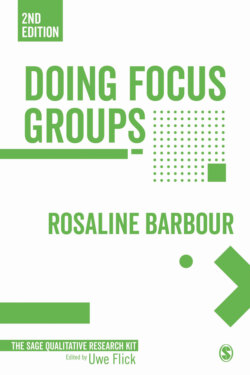Читать книгу Doing Focus Groups - Rosaline Barbour - Страница 18
На сайте Литреса книга снята с продажи.
Engaging with the ‘vulnerable’
ОглавлениеThis includes potential participants who are rendered especially vulnerable, as a result of particular experiences or attributes, many of whom might also be considered hard-to-reach using more conventional methods, such as surveys or interviews. Focus group researchers have had considerable success in engaging with, for example, people with learning difficulties (Kaehne and O’Connell, 2010); children with cerebral palsy, spina bifida or cystic fibrosis (Nicholas et al., 2010); individuals who have attempted suicide (Ghio et al., 2011); or those with severe mental illness (Whitley and Campbell, 2014). (Some of the issues involved in dealing sensitively and responsibly with participants who fall into these categories are considered in more detail in Chapter 7.) Broadening research engagement to include groups likely to have been marginalized, or even simply largely ignored, due to the acknowledged challenges of recruitment and sampling, is sometimes viewed as being inherently empowering, since it can act to ‘give voice’ to their experiences. Bringing such individuals together – albeit for research purposes – can, nevertheless, have the added benefit of providing support and some researchers have even found that focus groups can act as the catalyst for participants to set up ongoing support groups (as happened following a focus group study of fathers of children with cancer – Jones and Neil-Urban, 2003).
